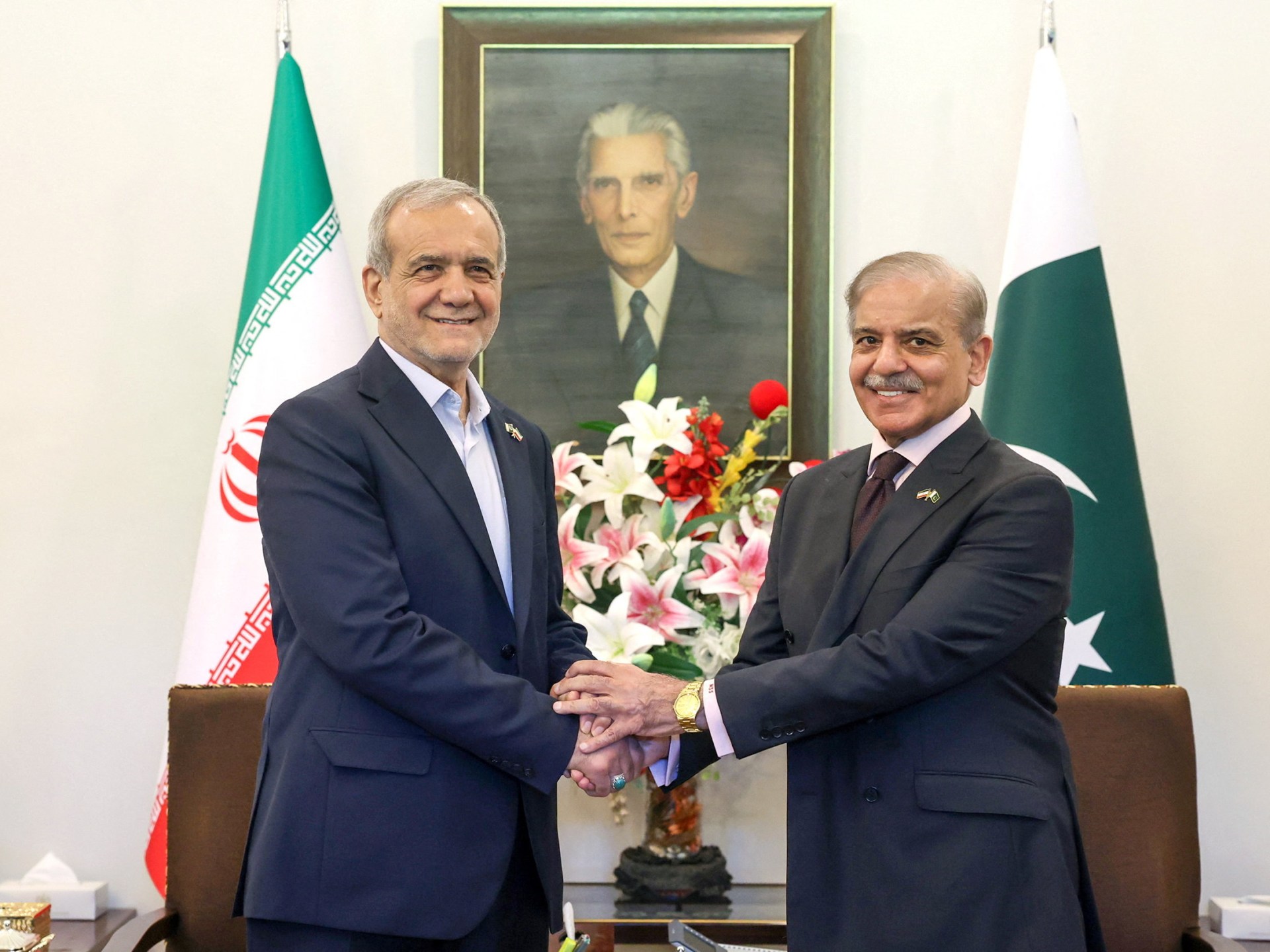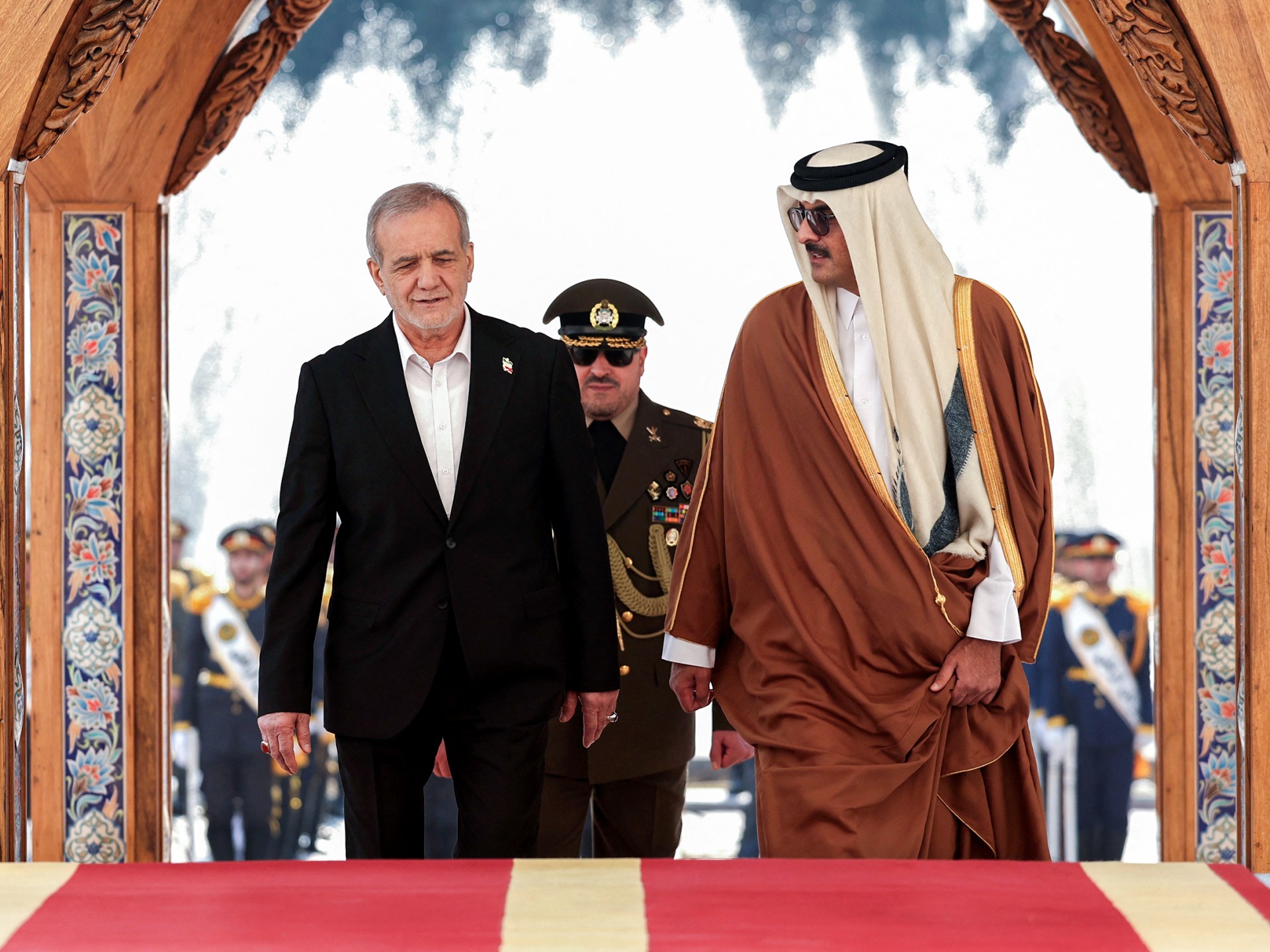Pakistan’s Sharif hosts Iran’s Pezeshkian, agrees to security, trade boost | International Trade News
Agreements, including those for the energy and trade sectors, have been signed during the two-day visit of the Iranian president.
Pakistan and Iran have signed agreements pledging to raise bilateral trade to $10bn and committing to work more closely to eliminate the menace of “terrorism” in favour of peace and prosperity in the region, as both nations have recently been embroiled in conflicts with their respective regional foes.
Sunday’s agreements across various sectors, including energy and trade, were signed during the two-day visit of Iranian President Masoud Pezeshkian.
“We have set a target of $10bn in trade and hope to achieve it as soon as possible,” Pakistan’s Prime Minister Shehbaz Sharif said, addressing a joint press briefing.
Sharif reiterated Pakistan’s stance of supporting Iran’s right to a nuclear programme for peaceful purposes under the United Nations charter and condemned Israel’s aggression against Iran, saying there was “no justification” for the 12-day June conflict in which the United States militarily intervened on Israel’s behalf.
He said the two countries would take effective steps to eliminate “terrorism” and open the avenues of prosperity in the region. Pakistan and regional rival India were on the cusp of their fifth all-out war earlier this year before a ceasefire ended several days of heavy and deadly aerial exchanges.
The Iranian president said, “My deep belief is that we can easily, in a short time, increase the volume of our trade relations from the current $3bn to the projected goal of $10bn.”
He thanked the government and people supporting Iran “during the 12-day terrorist aggression by the Zionist regime and the United States”.
Analyst Ammar Habib Khan of the Institute of Business Administration told Al Jazeera that the informal trade between Iran and Pakistan is likely to increase more than the formal trade target shared by the countries.
“Discussions have been held on how to formalise the informal trade that is already happening, whether it is oil, gas or something else,” he told Al Jazeera from Karachi.
The analyst said Pakistan’s normalising relations with Iran might lead to the creation of a trade route between Pakistan and Europe.
“It would be an efficient and logistically sound route,” he said.
Along with a high-level delegation, including foreign and defence ministers, Pezeshkian arrived on a two-day visit to Pakistan on Saturday.
Tense ties
Pezeshkian called for better border management and cooperation around the mutual border to counter security threats.
In return, Sharif said that Islamabad and Tehran have a common stand against “terrorism”, and no such activity would be allowed in Pakistan or Iran.
“We have to protect our borders and take strict steps against terrorism to open the roads to peace and development in the region,” said Sharif.
Relations between Pakistan and Iran have often been shaky, especially over cross-border tensions that escalated in January 2024 when both sides launched tit-for-tat missile strikes.
Al Jazeera’s Kamal Hyder, reporting from Islamabad, said Pakistan and Iran have agreed to cooperate in order to ensure violence is prevented on either side.
“They agreed to have more border management between the two countries,” he said.
Hyder added that the sides also discussed Pakistan acting as an intermediary between Washington and Tehran, among other countries trying to ease tensions between archenemies.
Despite the strains, the two countries have kept the diplomatic door open.
In May, the Iranian foreign minister visited Pakistan amid rising tensions with India. During the Iran-Israel conflict, Pakistan supported Iran’s right to self-defence and condemned the US attacks on Iran’s nuclear facilities.
The leaders of Pakistan and Iran also called for an immediate ceasefire in Gaza and an end to Israel’s attacks in the enclave.
The two sides also inked a string of memorandums of understanding in the fields of information technology, law and justice, climate change, and tourism.


